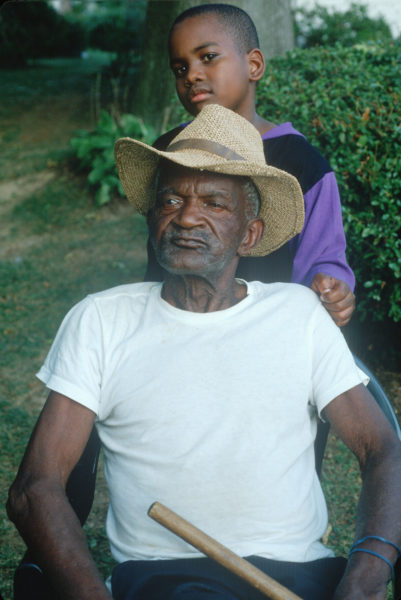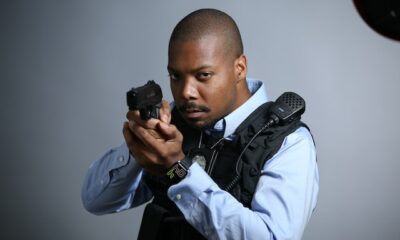Features
BN Prose: The Shivering by Keside Anosike
 Papa dies in the middle of the night, when the noise hitting through the lusty sky agitates the windows. When I first came to work here, to live in this house surrounded by more houses so low, they all looked like bare foundations, I found it difficult to sleep at night. I had lived next door to a major road for several years and wasn’t afforded the experience of darkness in my room due to streetlights that hung their heads like lions. So most nights here in Mbieri, I stayed awake, putting my legs on the dirty wall as I lay down and watched the shadows they formed, exaggerate into young, thin figures. Those nights, I listened to Papa and Mama talk till the sound of their snoring occupied their room and seeped into the dining, where I slept on the floor.
Papa dies in the middle of the night, when the noise hitting through the lusty sky agitates the windows. When I first came to work here, to live in this house surrounded by more houses so low, they all looked like bare foundations, I found it difficult to sleep at night. I had lived next door to a major road for several years and wasn’t afforded the experience of darkness in my room due to streetlights that hung their heads like lions. So most nights here in Mbieri, I stayed awake, putting my legs on the dirty wall as I lay down and watched the shadows they formed, exaggerate into young, thin figures. Those nights, I listened to Papa and Mama talk till the sound of their snoring occupied their room and seeped into the dining, where I slept on the floor.
Papa did not talk after mama died – he stopped eating too. Often times I found myself half close to the ground with my knees, trying to plead with him: three spoons of akamu, four spoons of rice, and on good days, two slices of bread was all I was permitted. He began to develop fevers at night and I began to find new ways to ensure that he took medicines – tablets were crushed with the bottom of a bottle and mixed with the evaporated milk I always served with his akamu. I also began to check him at night too. Later, after Papa is buried, I will find many ways to stay awake other than playing with my birthed shadows.
The crickets come and go that night, abolished occasionally by the sound of a thunderclap or a distant vehicle. Did Papa perhaps wonder where these cars were headed to, in a town as small as this, occupied by people who are still trying to live by petty trading and rearing poultry; people who still played war songs from decades ago, and gathered in diminishing numbers every fortnight to discuss the safety of their boarders. Where were these cars headed to at a time as this, when the moon was the only thing to be noticed? His room is long and inhabited by cobwebs stretching distances and the smell of herbs. His clothes, on the arm of a plastic chair is starched by harmathan, and the table at the foot of his bed holds his medicines, wristwatches and lazy dusts that I seem to overlook every time I clean the room.
The night feels cold; the lantern is so low that it resembles a distant yolk. I lay on the mat just outside his room, just before I try to force myself to sleep for what will become the last time in many years to come. I fall asleep and in my dream, Papa and I are at the market square for Azu day- we are surrounded by men in color-stormed fabrics heavy around their waists, and women too, who will nurture comments about everything but smile as they walk past. There is dust pushed by lazy feet and rearranged on the bodies of children who walk around the open space bare footed, their belly the shape of a ripening pawpaw.
Papa and I walk slowly, he is chewing one-sidedly on the brown pen-shaped wood, my hand is around his waist and we are talking about Mazi Dinta whose children never came home for Christmas. Papa tells me more stories about his children and grandchildren; even though I know them- I have seen them around every Christmas for seven years now. Since Mama died last year, Papa talks to me more- he revisits memories and takes me along.
Every morning, I stand by the stool he sits on and watch him brush his mouth: I know the exact lump of red he squeezes from the bottom of the tube onto his brush; I know how long it takes before he gaggles water and spits out. This daily routine of brushing is sacred for the both of us: it ushers in hours that consists of listening to the old radio that sits on top of the dining table, and staying by the veranda in the evenings to watch people return from what the day offered them. On Wednesdays we go to the mission together; Papa drives the car his daughter who lives abroad bought him- he makes me wash it twice a week, sometimes he comes out to the backyard to watch me struggle to reach the roof of the jeep. Other times he stays in his room, and on those days, I make sure my voice is loud enough as I sing. Papa depended on small, recurrent rituals like these and our lives, together, became saturated by an orderliness that pleased me. Because it was constant- anyone could come and meet us in the exact activity, and it birthed a renewed sense of ownership within me. It was something that belonged to me and could not be tampered with.
When we get to the center of the square, the white plastic chairs are idle and I can see that the boys who will later dress up as masquerades and stand in the middle of the road with bowls and long canes in a couple of days when people who lived in big cities return for Christmas act as ushers now. They are not wearing enough clothes and the under of their arms are thick with short forests. They greet Papa, their voices are loud enough to make a baby cry, but they do not acknowledge me. I mark their faces, when they too come to greet Papa’s son that lives in Lagos, I will make sure I serve them hot beer. Papa talks to one of them with a scar slanted across his face, asks why the festival hasn’t begun and he says something too confidently about it already starting. Papa doesn’t believe him, but he takes my hand and we walk away towards the canopy that has the name of his kindred spelt in red on a cardboard, on its roof. As we walked, I could hear, in the building violence of black speakers that stood on each other at the corner of the field, how my breathing was quicker now and wondered if his was, too. Vibrant, festival colors mixed and blurred in my sight, with the smell of smoke moving like the hands of a dancer, far into the sky, into fat clouds that stepped on each other.
I wake up from my dream to go and check Papa, to see if he is well covered with that old wrapper that has more length than breadth. Once Mama had used it over her head when the priest came to pray and give us communion wine, so now Papa sleeps with it; and he is still covered but his body is so cold. I dig my hands into my tough hair and pull from where my fingers reach. I pull harder; my mouth is open and moving but unable to form words that can hold. I push his body and it returns. His eyes are closed, decorated by wrinkles that walk down elegantly to his jawline and the sprinkle of gray on his head silhouettes like hissing oil in the dark. I hit my legs hard against the ground in an attempt to know if I am alive, but I hear the waltz of a moving car. I know my senses are with me; I sniff and smell death. It is the same smell of air.
It is two AM and I do not know what to do. When I peep out of the window with a fold of curtain in my hand, I see a silver sword fall from a lonely skyline to shake the orange tree that sits in the center of the compound, and then I begin to shiver too, just like the tree. Papa is dead and I am shivering. I return to his side and push his body harder. I say, “Papa, Papa”, but silence rings to my ears like gunshots. After a while, I climb on the bed to be with him, I hold his hands and they belong in the sea. Still I want to hold unto something, so I look around and search, but I am approached only by the sound of the ticking clock, and it terrifies me- like a hug from someone that in all likelihood was made to comfort, but somehow offered more sadness. I begin to think of how I will remain like this till morning, till I can run out and yell and scream; till Papa is wrapped up and taken to the mortuary. Lightning strikes again and my eyes begin to pepper.
Two days after they put Papa in the ground, I am loading Dee Uche’s car with tubers of yam, wraps of dried fish and palm oil, and Dee Uche is behind the opened bonnet, checking the oil and the water that should take them back to Lagos. When he closes the bonnet, I see the orange tree move like an unruly child in the early morning wind and I want to pluck some for Dee Uche, but the engine of his car is already shouting. Dee Uche’s children get out of the car suddenly- abruptly, as though they forgot something. They are not coming to hug me, still I want to beg them to stay longer than the three nights they spent, but the car is overloaded and too low and the gate slab is too high so that immediately after Dee Uche drives out of the compound, he stops for them to get back in.
I stand in the center of the road, sheltered in a ring of darkness, waving at them, waving at the car- not knowing which it was; watching the Toyota lights go smaller and smaller, eating into the bending distance of the road. As I am standing, my wrapper half loose around the side of my waist, I know exactly what I would do now: now that everyone is gone, now that the canopies have been dismantled and a huge truck will come in a couple of hours to pack the plastic chairs stacked to one corner of the compound and now that yesterday’s rain has washed away the blood at the backyard from killing cows, I will go inside and clean Papa’s room of the cobwebs and the dusts.
I will go and do all those, but right now I am not moving from this ring of darkness- this place before tears. I am consumed by something that is so heavy and present, like the skies above me, yet it feels singular- like finally, it was just I alone in the world; still waving, even when I know they can’t see me again and it is as though at this moment, I am a swimmer, drowning and gasping for something that is eternally above me- something I can see and know to be, but not within my reach.
*For Rose (called Ro-sah-lyn) who took the best care of my grandparents on their last days- sọsọ onwu ka gi ike.
Photo Credit: Dreamstime | Americanspirit
























